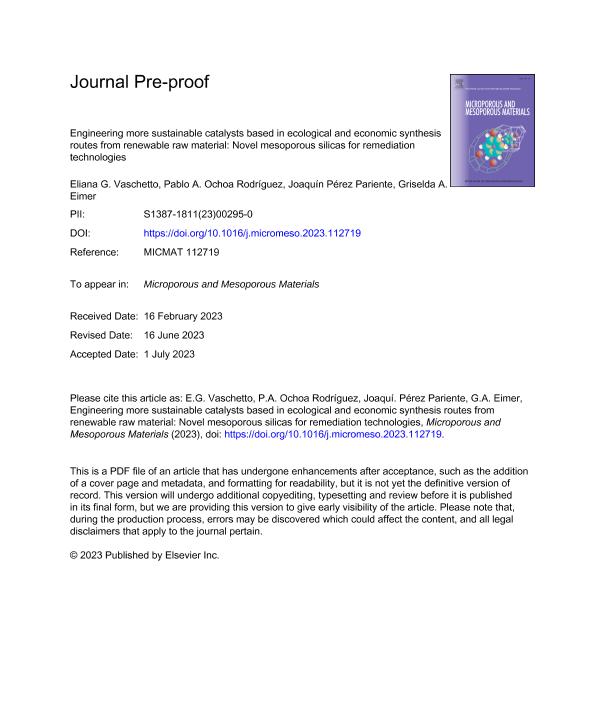Artículo
Engineering more sustainable catalysts based in ecological and economic synthesis routes from renewable raw material: Novel mesoporous silicas for remediation technologies
Vaschetto, Eliana Gabriela ; Ochoa Rodríguez, Pablo Alejandro
; Ochoa Rodríguez, Pablo Alejandro ; Pérez Pariente, Joaquín; Eimer, Griselda Alejandra
; Pérez Pariente, Joaquín; Eimer, Griselda Alejandra
 ; Ochoa Rodríguez, Pablo Alejandro
; Ochoa Rodríguez, Pablo Alejandro ; Pérez Pariente, Joaquín; Eimer, Griselda Alejandra
; Pérez Pariente, Joaquín; Eimer, Griselda Alejandra
Fecha de publicación:
07/2023
Editorial:
Elsevier Science
Revista:
Microporous and Mesoporous Materials
ISSN:
1387-1811
Idioma:
Inglés
Tipo de recurso:
Artículo publicado
Clasificación temática:
Resumen
Iron modified mesoporous silica structures were achieved from biomass-derived renewable molding agents (glyceryl monostearate and glycerol) and can become potential substitutes for conventional mesoporous catalysts synthesized from petrochemical-derived precursors. These materials were prepared by different methods (wet impregnation with iron contents of 2.5, 5, 10 and 20% w/w and direct incorporation using a molar ratio Si/Fe = 20) and characterized by XRD, N2 adsorption and desorption isotherms, UVvis-DR and ICP. By using these solid as heterogeneous catalysts in the wet oxidation reaction of the herbicide glyphosate with air under extremely mild reaction conditions (atmospheric pressure and room temperature), herbicide degradation/fragmentation levels of around 70% were achieved. The methodology employed for the synthesis played a key role in the development of the structure and dispersion of Fe species as well as in the stability of the catalytic system. In this way, an advanced technology with low environmental impact for the treatment of a pollutant of great concern at the global level was developed, which adds sustainability to the chemical industry from the use of residual glycerol and/or glyceryl monostearate in the catalyst synthesis.
Palabras clave:
RENEWABLE POROGENS
,
MESOPOROUS SILICA
,
GLYPHOSATE DEGRADATION
Archivos asociados
Licencia
Identificadores
Colecciones
Articulos(CITEQ)
Articulos de CENTRO DE INVESTIGACION Y TECNOLOGIA QUIMICA
Articulos de CENTRO DE INVESTIGACION Y TECNOLOGIA QUIMICA
Citación
Vaschetto, Eliana Gabriela; Ochoa Rodríguez, Pablo Alejandro; Pérez Pariente, Joaquín; Eimer, Griselda Alejandra; Engineering more sustainable catalysts based in ecological and economic synthesis routes from renewable raw material: Novel mesoporous silicas for remediation technologies; Elsevier Science; Microporous and Mesoporous Materials; 360; 7-2023; 1-30
Compartir
Altmétricas



